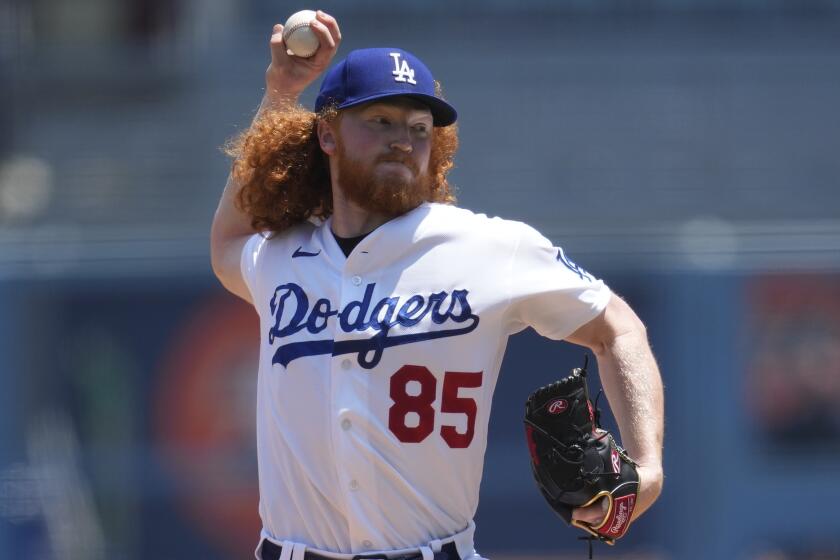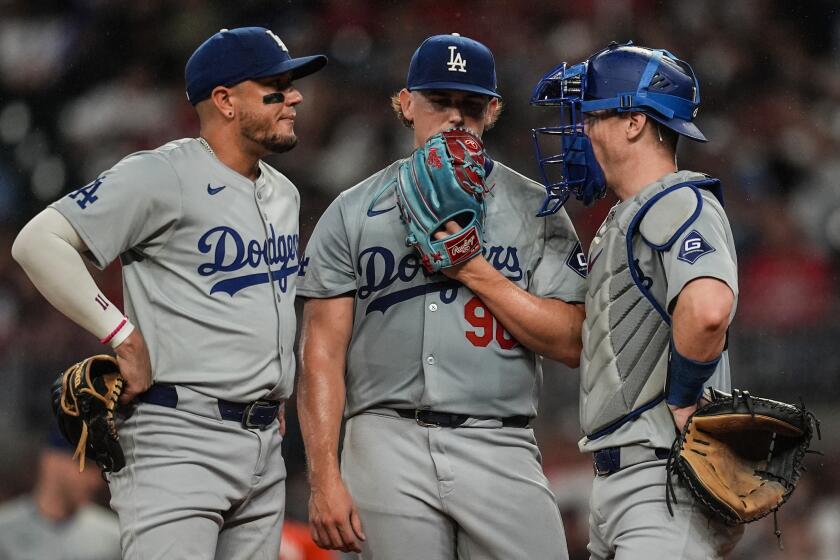It’s winnin’ time
The new Dodgers ownership team was supposed to hold an introductory news conference in New York on Wednesday, but when my phone rang around mid-morning, it was Magic Johnson saying it had been canceled.
“C’mon, this is a Los Angeles team, our first appearance has to be in front of the people of Los Angeles,” he said.
A good start, I think.
What ensued was a 20-minute conversation with the three main players in the $2.15-billion deal, all of them sitting around a New York conference room after having not slept the previous night, all of them still excited enough to raise their voices and emphasize their hopes.
“You know what this is about?” said Johnson, referring to money guy Mark Walter and baseball guy Stan Kasten sitting next to him. “This is about Jerry Buss II and Jerry West II.”
We can only hope.
For now, as the initial celebration fades and the close examination begins, Dodgers fans need to see proof that this dream team won’t just turn into another nightmare.
“You know I’m going to do this right,” promised Johnson. “I would not be putting millions of my dollars into this if we weren’t going to do it right.”
The questioning started here with Johnson. Will he be more than just a new Dodgers face and voice? Will he have the freedom to help run the Dodgers with his considerable business acumen and competitive spirit?
“You want to know Magic’s title? It’s owner,” Kasten said.
Johnson confirmed that he has already picked out a Dodger Stadium office and that, although he still has other business interests, this will be his main job and focus.
“I take, very seriously, the honor of being a minority owner in an organization where Jackie Robinson played,” Johnson said. “I’ll be there every day, fans will see me every day, I’ll be working hard to spread the word about how we’re going to make this a great franchise again.”
On more practical terms, it seems Johnson will be the owner with the most public accountability. Ticket snafu? Parking disaster? An unsafe situation in the stands? In promising to do things the right way, Johnson will probably be the owner who will answer and explain when they are done wrong.
“Last night when we found out we won, I cried and I yelled and I screamed,” said Johnson. “This is such a great day for our city.”
The questioning then moved to the controlling owner, Mark Walter, chief executive of the financial services firm Guggenheim Partners. The man behind the $126-billion bankroll grew up in rural Iowa, near the location of the Field of Dreams, but now lives in Chicago, where he has season tickets to the Cubs.
He says he won’t give up the season tickets because family and friends still attend Cubs games, but his company has a large office in Santa Monica, he plans on buying a residence in Los Angeles, and he says he fell in love with the Dodgers after taking several baseball trips with Tom Lasorda.
“We would like to build on what is obviously already a tremendous franchise,” Walter said.
“We are privileged and honored to be the new custodians of this tradition, and we hope to usher it in for generations to come.”
Walter said he would remain in the background of the club’s daily operations, allowing Kasten to oversee baseball and business matters while Johnson is the caretaker of the image.
“I’m a baseball fan, but I’m not qualified to make baseball decisions, and I don’t want to pretend to be,” said Walter. “I’m here to support and help my people as much as I can. I’m here to cheer as loud as I can.”
But since he still controls the purse strings, the bucks still stop with him, no? Will he give Kasten the freedom to spend them? How does he view the idea of paying the sort of big money for the sort of big free agents that the Dodgers have avoided signing during most of their 24-year championship drought?
“Stan has a very proven formula for building a team that doesn’t win one year, but wins 12 years in a row [Atlanta Braves], so for me to tell him how you build that is completely inappropriate,” said Walter. “But having said that, we really want to win, and it’s OK if, while we’re producing the best players in the world, we also have the best players in the world on our field.”
In other words, said Johnson, “We are going to have all the resources available to us to put a championship team on the field.”
Which brings the questioning to the guy whose vision is responsible for this championship. I’ve known Stan Kasten for more than 20 years, since his Braves and the Dodgers were battling for playoff spots in the early 1990s. I’ve never met a baseball executive who had a better grasp of the shaky marriage between the game’s economics and the game itself. He believes building a team from within is good business. But he also knows that, at the end of every day, winning is the only business.
“We understand what we just bought, we understand what it needs to be,” said Kasten. “We make more money when we win. We are real cognizant of that. While we want to build a long-term plan, we want to have a winner now.”
To understand Kasten’s baseball philosophy, check out his Braves team that won the 1995 World Series. His front office was led by powerful general manager John Schuerholz. His starting rotation was led by a high-priced free agent, Greg Maddux. His everyday lineup was filled with homegrown stars like Chipper Jones, Ryan Klesko and David Justice.
“I believe in scouting and player development, and a starting rotation,” Kasten said. “With both, anything is possible. Without both, nothing is possible.”
To understand Kasten’s business philosophy, check out the fan experiences that have greatly improved under his watch.
He was running the Braves when they moved into sparkling Turner Field, and he was running the Washington Nationals when they moved into cool Nationals Park.
Get ready, Dodger Stadium. Change is coming.
“Part of the special character of this investment is what Dodger Stadium is, and we hold it in the same esteem as the fans,” Kasten said. “In improving it, we will consider anything. It is wide open. We have a plan to update it in critically necessary areas, looking at ways we can add new things, improve the experience; we are rigorously considering everything.”
Put a baseball team out there in late October and we’re good.
--
twitter.com/billplaschke
More to Read
Are you a true-blue fan?
Get our Dodgers Dugout newsletter for insights, news and much more.
You may occasionally receive promotional content from the Los Angeles Times.









